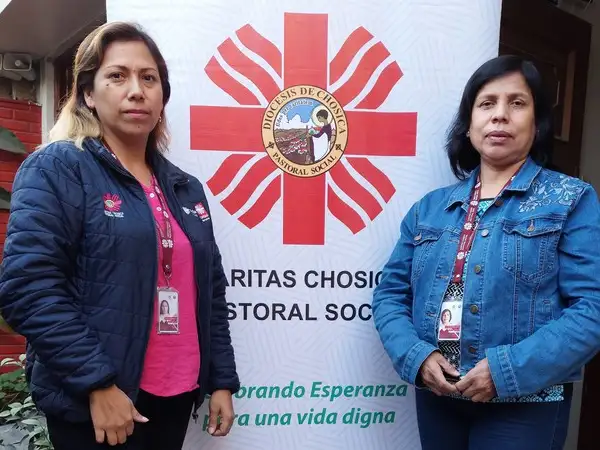G7 2022: More has to be done to achieve a global vaccine roll-out
G7 leaders failed to set out the action needed to rapidly roll out vaccines in low-income countries.


Rosalynn and Soledad from Caritas Chosica.
The impact of coronavirus on people’s mental health has become increasingly evident since the pandemic began. Thanks to your support, volunteers in Peru have been trained in emotional and spiritual listening and support.
Rosalynn and Soledad, from our Church partner Caritas Chosica, explain how they have supported people to survive and heal.
“During the Covid-19 pandemic, we have witnessed an increase in negative emotions such as anxiety, depression and fear, which have affected people’s mental health. Social distancing prevents personal relationships and also generates uncertainty. There are fewer opportunities and places to chat, to express affection, or to provide each other with emotional support.
“However, in the face of this crisis, people are able to respond with resilience to overcome their adversity. We have organised ourselves in community kitchens, volunteered to get bags of groceries for families, and offered our time to listen and provide emotional support from home. All of these efforts have allowed many to emerge strengthened and renewed."
“We know women who, despite all of this adversity, have overcome, grown and discovered new horizons”
Back in March 2020, Peru introduced one of the most severe lockdowns in Latin America. There are still restrictions on movement, and most children have yet to return to school after nearly two years.
Rosalynn and Soledad told us more about the effect that coronavirus and lockdowns have had on local people, particularly women.
“We have learned to see people from their potential, recognising their personal resources and discovering their mission in this world and in this time. We know women who, despite all of this adversity, have overcome, grown and discovered new horizons. They transform their pain, maintain their capacity to love, to fight and to face reality, learning to live in it."
In total, 24 volunteers have been trained in emotional and spiritual listening and support. They have made telephone calls to different people who requested this support for various reasons - including grief, loss of work, family relationships, stress and anxiety.
Throughout the pandemic, you have also helped Caritas Chosica to provide meals to local families who were ill with Covid-19 or who had lost their jobs, and helped people to buy the medicine they need. This included Venezuelan migrants in Peru, who faced the additional challenge of having no family around them to help out.
Coronavirus is a crisis that affects us all. But it continues to affect the most vulnerable communities the most. Our local experts are working round the clock to respond to the developing needs of the communities we work with around the world - thanks to your support.
G7 leaders failed to set out the action needed to rapidly roll out vaccines in low-income countries.
With your help, our sisters and brothers can survive coronavirus and also rebuild their lives – with love, dignity and hope.
With thanks to generous donations from supporters, you have helped to save lives in Brazil. Watch our short video to see how you have made a difference.
Thanks to your support, volunteers have been trained to help local people through the grief, stress and anxiety that have arisen during this time.
As the coronavirus crisis took hold last year, it impacted communities in every country CAFOD works in. The Catholic community in England and Wales responded with selflessness, compassion and love.
As Covid-19 continues to wreak havoc across the world – decimating people’s livelihoods, and leaving health systems struggling to provide healthcare and vaccines for the entire population – the Catholic Church should be seen as vital partner.
On World Radio Day, see how your support is helping us to broadcast trusted information to the most vulnerable people in Latin America and Africa.
The petition calls on the UK Prime Minister to push for debt cancellation for developing countries to avoid millions being pushed into poverty by the coronavirus pandemic.
Low and middle-income countries often have to spend more on paying back their debts than on healthcare, education or welfare.